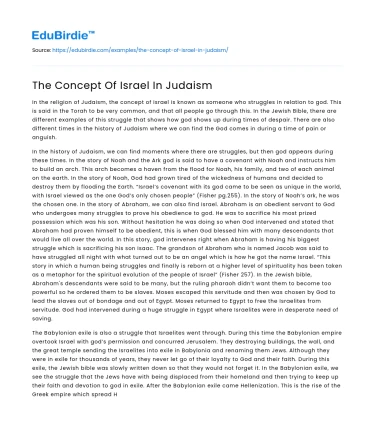In the religion of Judaism, the concept of Israel is known as someone who struggles in relation to god. This is said in the Torah to be very common, and that all people go through this. In the Jewish Bible, there are different examples of this struggle that shows how god shows up during times of despair. There are also different times in the history of Judaism where we can find the God comes in during a time of pain or anguish.
In the history of Judaism, we can find moments where there are struggles, but then god appears during these times. In the story of Noah and the Ark god is said to have a covenant with Noah and instructs him to build an arch. This arch becomes a haven from the flood for Noah, his family, and two of each animal on the earth. In the story of Noah, God had grown tired of the wickedness of humans and decided to destroy them by flooding the Earth. “Israel’s covenant with its god came to be seen as unique in the world, with Israel viewed as the one God’s only chosen people” (Fisher pg.255). In the story of Noah’s ark, he was the chosen one. In the story of Abraham, we can also find Israel. Abraham is an obedient servant to God who undergoes many struggles to prove his obedience to god. He was to sacrifice his most prized possession which was his son. Without hesitation he was doing so when God intervened and stated that Abraham had proven himself to be obedient, this is when God blessed him with many descendants that would live all over the world. In this story, god intervenes right when Abraham is having his biggest struggle which is sacrificing his son Isaac. The grandson of Abraham who is named Jacob was said to have struggled all night with what turned out to be an angel which is how he got the name Israel. “This story in which a human being struggles and finally is reborn at a higher level of spirituality has been taken as a metaphor for the spiritual evolution of the people of Israel” (Fisher 257). In the Jewish bible, Abraham's descendants were said to be many, but the ruling pharaoh didn’t want them to become too powerful so he ordered them to be slaves. Moses escaped this servitude and then was chosen by God to lead the slaves out of bondage and out of Egypt. Moses returned to Egypt to free the Israelites from servitude. God had intervened during a huge struggle in Egypt where Israelites were in desperate need of saving.
The Babylonian exile is also a struggle that Israelites went through. During this time the Babylonian empire overtook Israel with god’s permission and concurred Jerusalem. They destroying buildings, the wall, and the great temple sending the Israelites into exile in Babylonia and renaming them Jews. Although they were in exile for thousands of years, they never let go of their loyalty to God and their faith. During this exile, the Jewish bible was slowly written down so that they would not forget it. In the Babylonian exile, we see the struggle that the Jews have with being displaced from their homeland and then trying to keep up their faith and devotion to god in exile. After the Babylonian exile came Hellenization. This is the rise of the Greek empire which spread Hellenistic culture to the people. During this period the Syria ruler abolished the Torah, forced Hellenistic culture, killed families that circumcised their boys, and built an altar of Zeus. Then the Maccabean rebellion happened. This revolt was led by a priest who won independence for Judea and once again called it Israel. But conflicts began among the Hasmoneans and this caused a war between them. They then asked for the Roman general to choose a side and he decided to just take over Judaea. The Jewish people were now under the oppressive rule of the Romans and wanted for God to intervene to free them from this rule and return Israel to what it once was. This draws back to the term Israel as Jewish people who are struggling and trying to strive with god.
Though there have been many hardships in Judaism, the followers still make a great effort to abide by God. In the Jewish Bible, we see the central concept of exile and return and we see this throughout the history of Judaism. The stories and history of Judaism speak to the encounters that we have as humans and how in a time of need one can find God within ourselves.






 Stuck on your essay?
Stuck on your essay?

